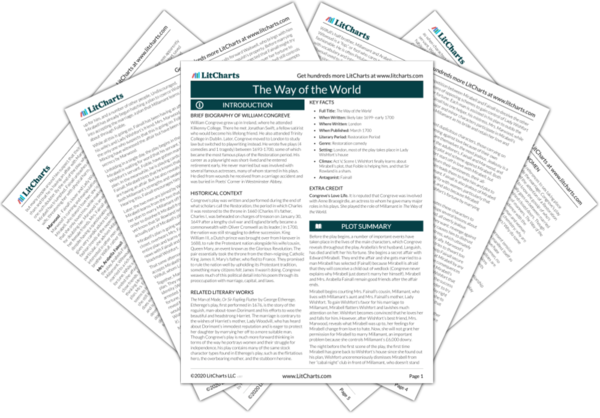Money is a distinct concern for several of the characters in Congreve’s play. Though greed does exist in the play—Fainall wants all of Wishfort’s fortune or as much as he can swindle—Congreve draws a more important connection between familial and romantic love and the desire for money as a means of financial security. This is an interesting coupling because it suggests that the sentiment of love itself is not enough to build a romantic relationship on or to protect family bonds. Money is actually an essential ingredient of love as money provides for a comfortable life, which then allows one to enjoy one’s love. For example, Fainall needs to acquire Wishfort’s fortune to support his mistress Mrs. Marwood. Meanwhile, Mirabell cannot simply elope with Millamant because then they would lose her £6,000 inheritance, a fact Fainall exploits in his scheme.
Even with the bonds of love that connect family members, money plays a central role. Lady Wishfort has control over the accounts of her daughter Mrs. Fainall and her niece Millamant, and is not above forcing their compliance by reminding them of this fact, especially Millamant. But in addition to using money to coerce her family members, Wishfort is also in charge of maintaining the family’s finances so these women have a nest egg when they come of age or marry.
Foible and Waitwell’s marriage itself is also a testament to this theme. Not only does their marriage benefit from Mirabell’s financial incentives (he gives Foible money for her help and promises to buy the couple land and stock their farm, if his plan succeeds), it is also occasioned as a type of insurance for Mirabell and a protection for Lady Wishfort. Waitwell’s marriage to Foible assures Mirabell that he can trust Waitwell to play the role of Sir Rowland and that Waitwell will reveal his true identity to Wishfort (because he’s already married) when Mirabell is ready to blackmail Lady Wishfort for Millamant’s hand in exchange for destroying the evidence of her false marriage to Sir Rowland.
Love and Money ThemeTracker

Love and Money Quotes in The Way of the World
Poison him? Poisoning’s too good for him. Starve him, madam, starve him; marry Sir Rowland, and get him disinherited.
You married her to keep you; and if you can contrive to have her keep you better than you expected, why should you not keep her longer than you intended?
Oh, what luck it is, Sir Rowland, that you were present at this juncture! This was the business that brought Mr. Mirabell disguised to Madam Millamant this afternoon. I thought something was contriving, when he stole by me and would have hid his face.
… I will be endowed, in right of my wife, with that six thousand pound, which is the moiety of Mrs. Millamant’s fortune in your possession, and which she has forfeited (…by the last will and testament of your deceased husband…) by her disobedience in contracting herself against your consent or knowledge, and by refusing the offered match with Sir Wilfull Witwoud
From hence let those be warned, who mean to wed,
Lest mutual falsehood stain the bridal-bed:
For each deceiver to his cost may find
That marriage frauds too oft are paid in kind.
















